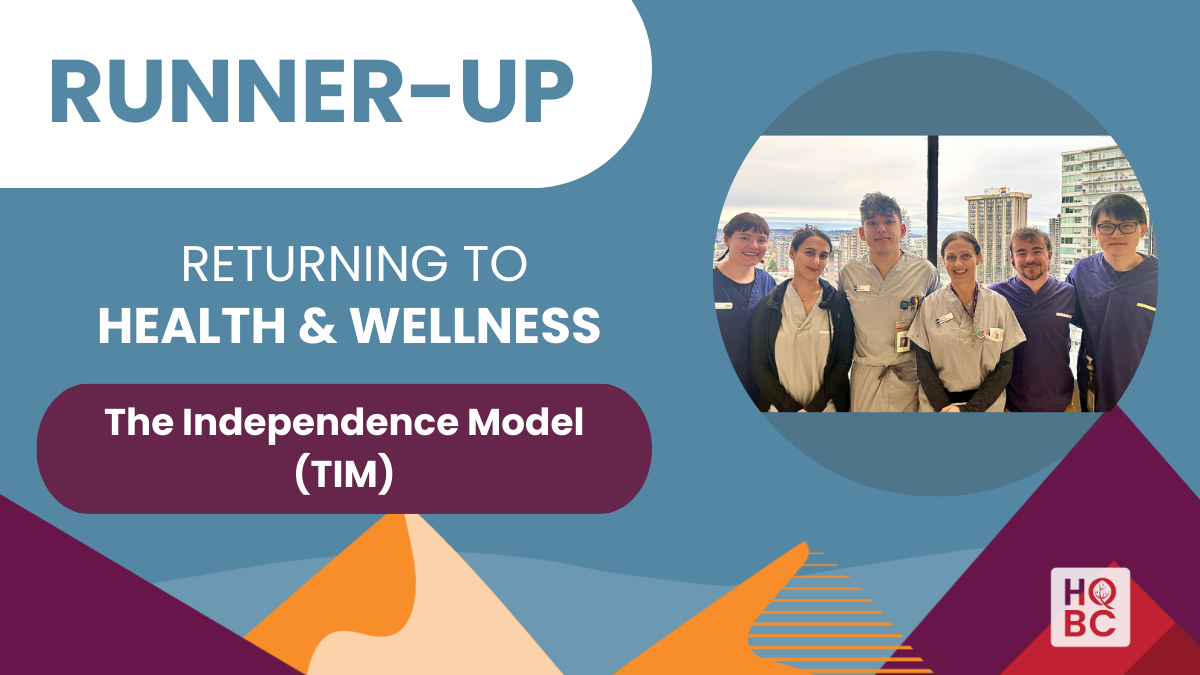- 2025
|
- Runner-Up
|
- Returning to Health & Wellness
The Independence Model (TIM) is a pioneering initiative at St. Paul’s Hospital (SPH) designed to prevent functional deterioration of patients admitted to acute care and to alleviate the workload of the nursing and allied health staff. This innovative model aims to preserve patients’ function holistically in areas such as walking, eating and personal care during their hospital stay. By focusing on maintaining these essential functions, TIM ensures that patients retain their independence, enhance their safety, build confidence and return home sooner.
At the heart of TIM is the optimization of the role of Rehabilitation Assistants (RAs). These trained professionals deliver targeted interventions tailored to each patient’s needs. By working closely with patients, RAs help them practice and sustain their physical and cognitive abilities. This personalized approach not only supports physical health but also promotes psychological well-being, contributing to an overall improved hospital experience.
A Therapy Lead (TL) coordinates the TIM RAs team and screens patients to determine their eligibility for TIM, while RAs deliver interventions at the start of hospitalization, preventing functional decline while patients wait for their medical conditions to resolve. TIM reduces unnecessary referrals to occupational therapy (OT), physical therapy (PT) and speech-language pathology (SLP), allowing these specialists to focus on providing specialized care. Utilizing RAs also helps address recruitment challenges in OT, PT and SLP (e.g., in July 2021, SPH had a 28% vacancy rate for PTs). TIM RAs spend 5-6 hours daily directly caring for patients. By front-loading rehabilitation services, they are enhancing patient care.
Personalized interventions allow RAs to assess each patient’s baseline abilities and develop individualized care plans. These plans include exercises and activities that patients can perform safely within the hospital environment, aiming to replicate their normal daily routines.
Multidisciplinary collaboration means TIM fosters collaboration among healthcare providers, including nurses, rehabilitation therapists and RAs. This team-based approach ensures comprehensive care, addressing all aspects of a patient’s health and well-being.
Patient and Family Engagement is fostered by TIM actively involving patients and their families in the care process. Education and training are provided to both patients and caregivers, equipping them with the knowledge and skills to continue supporting independence post-discharge. Patient progress is continuously monitored and care plans are adjusted as needed. This dynamic approach ensures that interventions remain effective and responsive to changing patient conditions. “The TIM RAs are amazing! They take so much pressure off our overworked nursing staff. It has a clear impact on our workload for the better,” commented a nurse on the medicine unit at SPH.
Since its implementation, TIM has significantly improved patient outcomes at St. Paul’s Hospital. Patients report higher satisfaction levels due to the increased focus on their personal goals and abilities. The proactive and supportive environment fostered by TIM contributes to a more positive hospital experience. By preventing functional deterioration, TIM likely reduces the risk of falls and other hospital-acquired conditions, ensuring a safer environment for patients.
“The Independence Model (TIM) is a shining example of interprofessional collaboration driving quality improvement in acute care. By targeting critical gaps in care and preventing functional decline, this innovative model empowers patients to regain and maintain independence from the moment of admission. Rooted in evidence-based practices and developed to address challenges such as rehabilitation shortages, TIM reduces delays in discharge, improves patient outcomes and enhances care experiences. The team’s commitment to collaboration, patient-centred care and excellence sets a new benchmark for quality and innovation in health care delivery,” shared Indershini Pillay, one of the project’s leads and creator of TIM.
TIM represents a transformative approach to inpatient care at SPH. By prioritizing the maintenance of patients’ functional abilities, TIM enhances quality of life, promotes faster recovery and ensures a safe return home.


